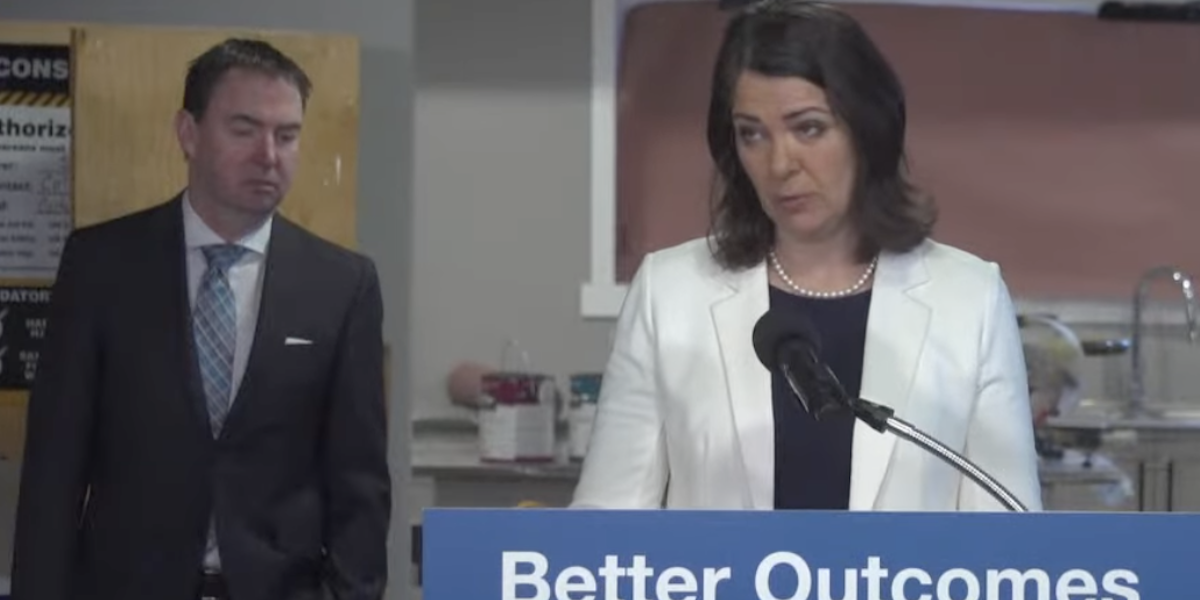You just never know what Danielle Smith is going to say next.
The trouble is, neither does she.
Consider Thursday’s jaw-dropper, the latest in what is getting to be a fairly long list of statements requiring clarifications – clarifications that may soon require their own clarifications.
At what was supposed to be a good-news press conference yesterday morning about a new transition facility for homeless discharged Emergency Department patients, the premier was asked a question about her United Conservative Party (UCP) leadership-campaign promise to get charges against vaccine refuseniks dropped.
“The way our system of justice works,” she responded piously, pretty clearly trying earnestly to stick to a talking point someone had drafted for her, “is that we do have an independent justice department and independent Crown prosecutors, and I have asked them to consider all charges under the lens of, ‘Is it in the public interest to pursue?’ and, ‘Is there a reasonable likelihood of conviction?’”
Reading these words in black and white, you can almost imagine the premier wandering blithely toward the precipice.
“As we continue to see these cases go through, some of them get dropped, some of them fail,” she meandered onward. “They have to consistently recalibrate. But I do want to make sure that they have an independent process for assessing that …”
Here, Smith had reached the moment where she had made her point and, to put it bluntly, needed to shut up.
Instead, with a pause of barely a breath, she rambled on: “… but I ask them on a regular basis as new cases come out, ‘Is it in the public interest to pursue?’ and ‘Is there reasonable likelihood of conviction?’” (Emphasis added, of course.)
That was the instant you could hear the trap spring shut. Smith had talked her way into another corner. This was the moment someone on the premier’s communications staff must have quietly lowered their face into the palm of their hand.
Just after noon, Mount Royal University political scientist Duane Bratt tweeted: “Imagine that you are a crown prosecutor who has laid charges against someone for violating covid restrictions. Now the Premier calls you if the charges are in the public interest and if there is a reasonable chance of conviction. This is attempted political interference.”
“It’s not *attempted* interference,” responded University of Alberta political scientist Jared Wesley soon after. “It’s interference. Only question: was it successful or not”?
At 1:13 p.m., Opposition Justice Critic Irfan Sabir, a lawyer by profession, published an 11-part Twitter thread that began, “An immediate independent investigation is warranted into Danielle Smith’s interactions with Crown prosecutors in light of her admission that she has frequently questioned them about their prosecutorial judgment.”
“Danielle Smith is reaching into the Crown prosecution branch, and enquiring about a specific case and questioning whether charges are in the public interest, and that certainly constitutes interference,” he continued. “Danielle Smith’s actions undermine the rule of law and it is deeply disturbing to see that she does not understand that at all.”
In his comments, Sabir drew a parallel to former premier Jason Kenney’s actions after the revelation then justice minister Kaycee Madu (who, as the New Democrat pointed out, is now Smith’s deputy premier) was discovered to have phoned Edmonton’s police chief to talk about a traffic ticket he had received.
Kenney first made Madu “step back” from his ministerial duties, then booted him from the justice portfolio, demoting him to minister of labour.
“Now the Premier is calling the Crown prosecutors office regarding a specific case, which clearly constitutes interference,” Sabir said. “We are calling on the current justice minister @shandro to step up and call an independent investigation immediately.”
Justice Minister Tyler Shandro, by the way, has his own problems. On January 24, he is scheduled to face an Alberta Law Society disciplinary hearing into accusations of unprofessional conduct when he was health minister.
Later in the day, responding to media questions, the Justice Department tried to help – and may have made things worse. “The premier had met to discuss prosecutions at a high level with the attorney general and deputy attorney general,” the department’s spokesperson told the Canadian Press.
“The premier has never spoken with any Crown prosecutors about any particular court/legal matter they deal with,” he added, thereby leaving the impression that if the premier didn’t interfere with the administration of justice, then she lied about what she did.
Whatever happened, Smith is now in hot water again, and further clarifications are going to be required.
Whether it was serial interference, a casual lie, or just an inability to stop talking so severe the premier should never be allowed near a microphone again doesn’t really matter. Smith is clearly not suitable material to be the mayor of High River, let alone premier of the province of Alberta.
Another lawyer associated with JCCF arrested and charged
CBC News reported yesterday that another lawyer associated with the so-called Justice Centre for Constitutional Freedoms has been arrested and charged with intimidation of a justice system participant and attempting to obstruct justice by spying on Manitoba’s chief justice.
“Jay Cameron, 45, was arrested by the Calgary Police Service on Wednesday after a Canada-wide warrant was issued by the Manitoba Prosecution Service,” the CBC reported in classic police blotter style.
Those were the same charges laid last week by Winnipeg Police against Calgary lawyer John Carpay, founder and president of the Alberta-based social conservative legal advocacy organization.
Carpay admitted on July 12, 2021, that his organization hired a private investigator to spy on the judge, who was presiding over a case conducted by the JCCF on behalf of seven rural Manitoba churches that objected to public health orders made early in the COVID-19 pandemic.
Unlike after Carpay’s arrest, the JCCF had very little to say yesterday about the charges against Cameron, who appears no longer to be directly employed by the organization.



